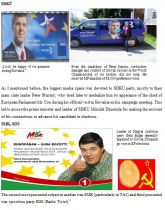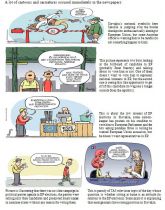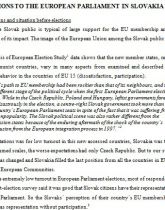Semestrálna práca: Elections to the European parliament in Slovakia
Skryť detaily | Obľúbený- Kvalita:76,3 %
- Typ:Semestrálna práca
- Univerzita:Univerzita Komenského v Bratislave
- Fakulta:Fakulta sociálnych a ekonomických vied
- Kategória:Humanitné vedy
- Podkategória:Dejepis
- Autor:lusiliatko
- Ročník:5. ročník
- Rozsah A4:7 strán
- Zobrazené:2 125 x
- Stiahnuté:1 x
- Veľkosť:0,7 MB
- Formát a prípona:MS Office Word (.doc)
- Jazyk:anglický
- ID projektu:8093
- Posledna úprava:24.01.2018
Expectations and situation before elections
The Slovak public is typical of large support for the EU membership and positive evaluation of its impact. The image of the European Union among the Slovak public is positive as well.
The analysis of European Election Study data shows that the new member states, mainly eight post-communist countries, vary in many aspects from examined and described models of electoral behavior in the countries of EU 15 (dissatisfaction, participation).
„Slovakia’s path to EU membership had been rockier than that of its neighbours, and it
was at a different stage of the political cycle when the first European Parliament elections
took place. While in the Czech Republic, Poland and Hungary, leftist governments fared
badly or disastrously in the election, a centre-right Slovak government took more than
half the country’s European Parliament seats in spite of the fact that it was suffering from
mid-term unpopularity. The Slovak political scene was also rather different from the
other accession states because of the enduring aftermath of the shock of the country’s
initial exclusion from the European integration process in 1997.“
The expectations was for low turnout in this new accessed countries, Slovakia was the last but one in assumed scales, the worse expectations had only Czech Republic. But to our surprise the situation has changed and Slovakia filled the last position from all the countries in EU from the history of European Communities.
Despite the extremely low turnout in European Parliament elections, most of respondents taking part in post-election survey said it was good that Slovak citizens have their representatives in the European Parliament. So the Slovaks´ perception of their country´s EU membership may be described as representation without participation.
The one of interesting aspects of the election was also that No communists, nationalists or extreme Eurosceptics were elected. For the first time since its foundation in 1991, Meciar’s Movement for a Democratic Slovakia (HZDS) did not get the highest party vote in a national election. The Slovak political scene was also rather different from the other accession states because of the enduring aftermath of the shock of the country’s initial exclusion from the European integration process in 1997.
The Slovak public is typical of large support for the EU membership and positive evaluation of its impact. The image of the European Union among the Slovak public is positive as well.
The analysis of European Election Study data shows that the new member states, mainly eight post-communist countries, vary in many aspects from examined and described models of electoral behavior in the countries of EU 15 (dissatisfaction, participation).
„Slovakia’s path to EU membership had been rockier than that of its neighbours, and it
was at a different stage of the political cycle when the first European Parliament elections
took place. While in the Czech Republic, Poland and Hungary, leftist governments fared
badly or disastrously in the election, a centre-right Slovak government took more than
half the country’s European Parliament seats in spite of the fact that it was suffering from
mid-term unpopularity. The Slovak political scene was also rather different from the
other accession states because of the enduring aftermath of the shock of the country’s
initial exclusion from the European integration process in 1997.“
The expectations was for low turnout in this new accessed countries, Slovakia was the last but one in assumed scales, the worse expectations had only Czech Republic. But to our surprise the situation has changed and Slovakia filled the last position from all the countries in EU from the history of European Communities.
Despite the extremely low turnout in European Parliament elections, most of respondents taking part in post-election survey said it was good that Slovak citizens have their representatives in the European Parliament. So the Slovaks´ perception of their country´s EU membership may be described as representation without participation.
The one of interesting aspects of the election was also that No communists, nationalists or extreme Eurosceptics were elected. For the first time since its foundation in 1991, Meciar’s Movement for a Democratic Slovakia (HZDS) did not get the highest party vote in a national election. The Slovak political scene was also rather different from the other accession states because of the enduring aftermath of the shock of the country’s initial exclusion from the European integration process in 1997.



